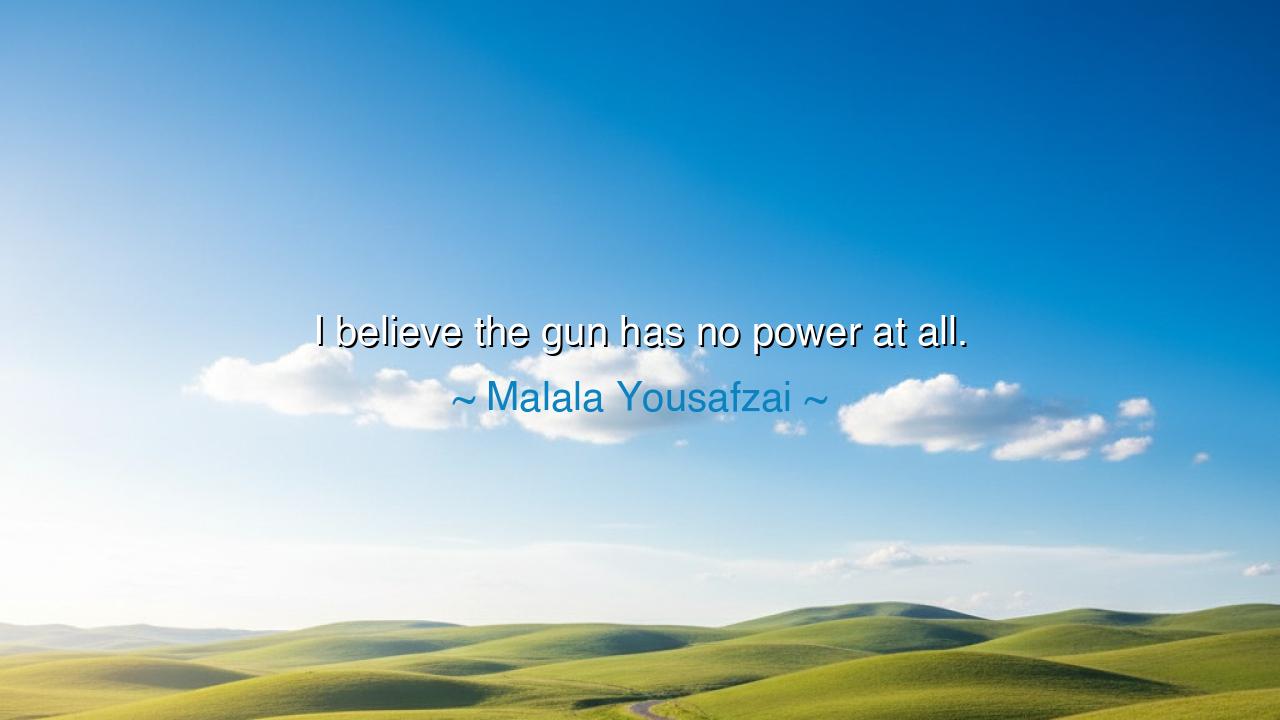
I believe the gun has no power at all.






There are weapons forged of steel and fire, and there are weapons forged of spirit and truth. When Malala Yousafzai, the young warrior of peace, declared, “I believe the gun has no power at all,” she spoke not as one ignorant of violence, but as one who had faced it directly and triumphed through courage. Her words carry the weight of a profound truth: that true power does not come from instruments of death, but from the unshakable resolve of the human heart.
A gun can wound, silence, and destroy, but its reach ends at the body. It cannot command love, nor can it kindle hope or crush the eternal flame of an idea. Those who wield weapons believe themselves mighty, yet their strength is fleeting, for fear cannot bind the soul forever. Malala’s defiance shows that the power of education, of words, and of justice outlasts the terror of violence. In this way, the gun is revealed to be a hollow symbol, loud in its noise but empty in its essence.
Malala herself lived this truth in flesh and blood. As a young girl in Pakistan’s Swat Valley, she dared to speak for the right of women to learn, defying those who sought to silence her. The enemies of knowledge struck at her with a gun, believing that a single bullet could extinguish her voice. Yet she survived, and her message grew stronger, spreading across the world. The very weapon meant to silence her became the spark that ignited a global movement. Here, history itself testified to her words: the gun had no true power, for it could not destroy truth.
History offers other echoes of this principle. Mahatma Gandhi, armed with nothing but nonviolent resistance, brought down the mighty British Empire. His oppressors held rifles and cannons, yet they could not defeat the collective will of millions who refused to bow. Likewise, Martin Luther King Jr. led marches against hatred, proving that moral strength surpasses the might of armies. These heroes remind us that while violence may command obedience for a moment, only justice and compassion can command hearts for generations.
Let this teaching be etched into the hearts of all: do not fear the gun, for it is but a tool of the moment. Fear instead the silence of truth, for that is where evil truly triumphs. Stand firm in the belief that power lies not in destruction, but in creation—in building schools instead of prisons, in raising voices instead of weapons. For as Malala has shown the world, the most enduring victories are not won through bullets, but through courage, knowledge, and the indomitable spirit of those who refuse to surrender to fear.






LLam
I find this both courageous and thought-provoking. It suggests that physical weapons are ineffective against the strength of human spirit and moral conviction. But does this underestimate the immediate threat and consequences of guns in conflict zones? I wonder how this belief shapes strategies for education, activism, and policy. Could embracing this mindset shift the balance from violence to dialogue, or is it more an aspirational principle than a practical reality?
TVLau Thi Vang
This quote provokes a deep reflection on the nature of power. If a gun has no real power, then what does? Perhaps it is the resolve, unity, and ideas of people that hold the true force. I’m curious whether this viewpoint applies universally, or if it assumes a context where courage and conviction can prevail over oppression. How can societies cultivate the belief in human resilience over brute force?
BVminh bui van
Reading this, I feel inspired but also skeptical. It challenges the common perception that weapons enforce authority. Does she mean that true change cannot be achieved through violence, and that moral conviction outweighs physical force? I wonder how this perspective influences activism, diplomacy, or personal safety. Could it be that the gun’s power is contingent, dependent on whether people fear it or choose to resist it?
UGUser Google
This statement feels incredibly hopeful and idealistic. It makes me wonder whether Malala is referring to literal firepower or the symbolic power of fear and intimidation. Can a gun truly hold no power in a world where violence often dictates outcomes? I’m curious how she reconciles her belief with the harsh realities of armed conflict and oppression. Is this a call for moral courage and nonviolence as stronger forces than weapons?